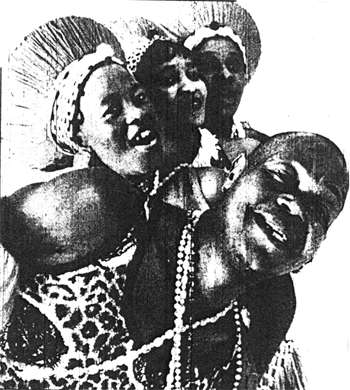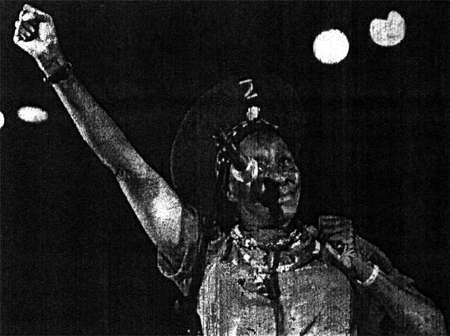
Botanic Park Adelaide.
Feb 19th-21st 1993.
| Mahlathini and the Mahotella Queens.
|
 |
MAHLATHINI and the Mahotella Queens go back about as far as the Rolling Stones. They were making hit 78s in their unique Mbaqanga style at about the time Mick Jagger was singing Little Red Rooster. The 30-year-old band has played its jumpy, jerky dance rhythms through South Africa's turbulent recent history. Band members knew they were on to a good thing with millions of record sales in South Africa but it was only in 1986 that they began to make an international name for themselves. Like the Jaggers of the First -World, they are now all in their 50s but Marks Mankwane swears they still move in ways you would not believe, particularly the three Mahotella Queens. Marks Mankwane, soon to be 51, is the lead guitarist of the l0-member group, and one of many who have stuck with the band through its unlikely history. Speaking from Johannesburg, he chronicled the band's story, from its humble black town origins to its highly successful International tours, He comes from a small town, Warmbus, in the Transvaal and learnt to play his brother's acoustic guitar, with its surviving three strings, from the age of 12. Along with the other band members, he is the architect of the Mbaqanga style, a style heard in the musical , Sarafina, at the Adelaide festival last year.
Mankwane says the band simply created the music from existing South African traditions - the Kwela; a very fast penny-whistle music from the towns , the Marabi, slow-rhythmed traditional music, and local town jazz. "When we started this group. we decided also to start our own style of music, and that was Mbaqanga.'' he said. "So we decided to bring in Western style drums and more guitars and put the tempo up for dancing, and that's where the Western Influence comes in" On top of the band's rhythms was added the harmonies of the Mahotella Queens; a group, originally of five women , who soon pared back to three. To set off the Queens came lead singer Mahlathini's extraordinary rasping, deep bass voice.
 |
Mbaqanga might not roll off the Western tongue as easily as rock'n roll but the group knew it was on a winner and set out to promote the music , which was far from easy. In Johannesburg in 1964 there was virtually no access to radio for black performers in South Africa. The only black African radio show ran from 9am to 9:30 am. They knew nothing of television. Mahlathini and the Mahotella Queens went in for direct marketing . They made 78 records of their first songs, asked the record shop for a power point, and played their music in the street .If anyone liked the music they were shown into the record shop "By doing this it was clear that people loved us because there would be so many people before the police came,'' said Mankwane. Before long, the group was selling every record it could make ,although it could make only short playing 78s and 45s in the 1960s. In 1970, the group disbanded. The men continued to work in the music industry while the women retired to have children. All of them, however, continued to spend time together .It was an unhappy time for South African music, according to Mankwane "During that time, Western music got into South Africa and our music slept, and died off, and we just borrowed the Western styles,'' he said. |
In 1983 , the group reformed with almost all the original members. "We decided to take over from where we left off," said Mankwane. They were successful again immediately, at first reproducing and re-recording the old favorites to meet popular demand, but increasingly adding fresh songs to the repertoire. Having toured overseas successfully from 1986, the band now has a bigger international market than at home.
Womadelaide will introduce the band to Australia.
Since this article was written, Mathlathini and two other badn members has passed on and the three ladies have taken to the road with a new band, the spirit lives on, except that age is slowing down the pace of their dancing !
IIf you have any photos , setlist or recording information you would like to add to this site, please don't hesitate to contact us via the main archive address . Just follow the link .
Links to articles on the 1993 festival.
| |
|
|
|